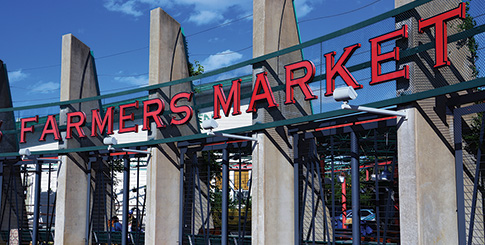Indeed, Amazon’s $13.7 billion acquisition of Whole Foods is having an impact. “Amazon’s play with Whole Foods has really shaken things up,” observes Stachurski. “Retail seems to be an evolving market here,” he adds, as everyone tries “to figure out what consumers want next”—which may be a combination of bricks-and-mortar stores and online ordering and delivery.
Other competition is coming from meal kit companies, taking a nibble from supermarket sales by delivering fresh ingredients for home-cooked meals. “I think meal kit companies have definitely had an impact on retail,” remarks Acton.
Although meal kits currently represent only $1.5 billion out of the $800 billion grocery industry, analysts believe these numbers are on the rise. Globally, meal kits are now a $2.2 billion business, and Pentallect, a Chicago-based food industry consulting firm, predicts annual growth will be 25 to 30 percent over the next five years.
Restaurant Revolution
Like wholesalers, retailers, and meal kit providers, the foodservice industry also continues to shift into high gear. “The restaurant scene in Dallas is evolving very quickly,” confirms Stachurski. “There are all kinds of new concepts being tested in the Dallas market, and there’s been a lot of growth and new ideas from restauranteurs.”
According to the Texas Restaurant Association, the Lone Star State is home to a $52.4 billion foodservice industry, with more than 43,000 locations throughout the state—with the DFW metro area home to nearly 14,000 restaurants.
“The restaurant scene in Dallas has been pretty strong over the eight years I’ve been here,” comments Juan Manuel Ibarra, CEO and president of Marengo Foods Company, LLC, a Dallas-based grower-shipper. “There are always new restaurants being added, and I’ve noticed organic leaf items, as well as vegetables like tomatoes, have become a big part of menus.”
There has been some downsizing, however, as Stachurski has noticed some consolidation in longtime or legacy restaurant brands in the metroplex. “Some that have been around for a long time, especially in the casual dining sector, are starting to reduce store counts as the economy changes and eating trends change.”
Dancing Around
In both retail and foodservice, produce businesses have noticed an uptick in demand in several categories. Marvin Offutt, general manager of Dallas-based wholesaler United Fresh Produce Group LP, points to growing demand for prepackaged fruits and vegetables. “We’re going more and more into prepackaging,” he says. Today’s consumer wants not just convenience and ease of use, but sustainable and flexible packaging as well.



